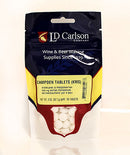Description
Campden Tablets Potassium Metabisulfite - 100 ct
Use one Campden tablet per gallon. Contains potassium metabisulfite and is a convenient way to accurately sulfite wine. Releases sulphur dioxide, which acts as a sterilant and antioxidant. 100 per bag.
Use one Campden tablet per gallon. Contains potassium metabisulfite and is a convenient way to accurately sulfite wine. Releases sulphur dioxide, which acts as a sterilant and antioxidant. 100 per bag.
(Crush and dissolve in warm water before adding)
Potassium metabisulfite comes with just about every wine kit we sell and is used as an additive even in private and commercial wineries.
Potassium Metabisulphite is an antioxidant. It slows down the aging and oxidation of wine by removing free oxygen suspended in the wine. Oxygen is both harmful and beneficial to wine. It is harmful in large quantities because it rapidly accelerates the aging process. However, wine with too little oxygen your hard work can develop off flavors.
Potassium metabisulfite is often called a stabilizer because it serves to prevent spoilage and further fermentation by removing oxygen. However, adding potassium metabisulphite preserves the flavor and color of a wine. An oxidized wine can turn red wines orange and eventually a very unappealing brown. White wines will also turn brown with too much oxygen.
This additive is available in a powdered form as pictured here as well as in tablets called campden tablets.
Potassium metabisulfite may also be used as a sanitizing agent due to its antioxidant properties. When you dissolve Potassium Metabisulphite in water it forms three different compounds, sulfur dioxide, bisulfite, and sulfite. Each of these is able to bond with free oxygen floating around in wine. When this happens the free oxygen is no longer available to be consumed by micro-organisms. The removal of oxygen chokes off most micro-organisms and will prevent them from reproducing. It does not, however, stop a fermentation. Yeast produces alcohol only when forced to live without oxygen but it does go on living.
By adding potassium metabisulfite after you’ve stopped fermentation completely you can then back sweeten a wine with little risk of rekindling the fermentation of newly added sugar. Sodium Metabisulfite can be used interchangeably with potassium metabisulfite. While they both have very similar chemical makeups the difference is that potassium metabisulfite leaves potassium behind and sodium metabisulfite leaves sodium behind. Potassium occurs naturally in grapes and is essential to their growth. So adding a bit more potassium to the mix isn’t going to hurt anything. There’s already some in your wine. Sodium on the other hand is not something we want to add to our wine, the left over Sodium in your wine will taste salty.
A few things to know about potassium metabisulfite. The compounds it creates can be hazardous to your health in large quantities. SO2 is a toxic gas. Be careful not to breath the dust in or gas that is released when dissolving in water. After adding potassium metabisulfite to your wine, give it time to bond with the wine before tasting any samples. Potassium metabisulfite is a controlled substance in food and wine preservation.
Caution : Please use caution when adding SO2. Once it’s been added it is not easy to remove. The only remedy is to give it lots of time to dissapate. Chemically there isn’t much you can do.
Also, potassium metabisulfite can be very agitating to your eyes and respritory system. Handle the powder carefully and do not let the dust into your eyes or breath it in.
Payment & Security
Your payment information is processed securely. We do not store credit card details nor have access to your credit card information.


